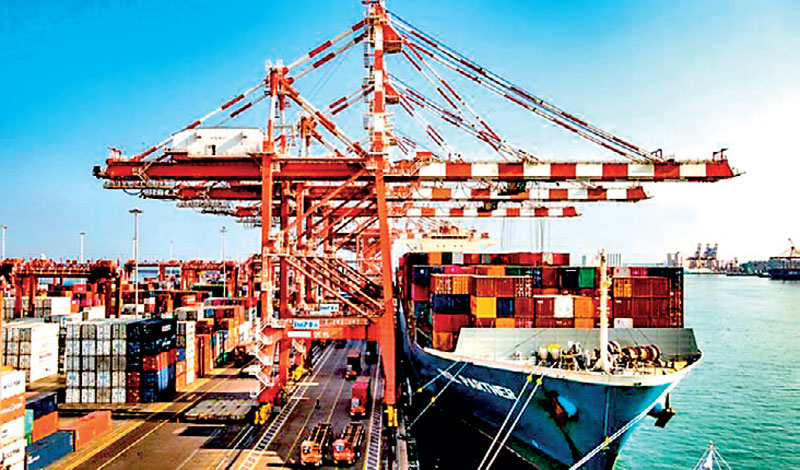Monday Feb 16, 2026
Monday Feb 16, 2026
Monday, 14 February 2022 03:07 - - {{hitsCtrl.values.hits}}

George Steuart & Co. is one of the oldest business enterprises in Sri Lanka (Ceylon), with origins dating back to 1835. George Steuart Insurance Brokers Ltd. a subsidiary of the company is one of the leading Corporate Brokers in the industry, with marine insurance capability in keeping with the rich maritime tradition of the company
|
 By Kumar Muthiah
By Kumar Muthiah
History and origin
Marine insurance is arguably one of the oldest forms of insurance which came into existence as a panacea for recovering losses sustained by ship and cargo owners in their trade endeavours. The modern concept of marine insurance practice, however, can be traced to Lloyds of London. Developing from simple beginnings, the industry developed into the behemoth it is today.
The London Market eventually became the global marine insurance hub, with other markets evolving later to stake their claim in the ever-expanding pie.
Progression and development
The early stages of marine insurance saw the emergence of single policies covering both the ship and goods, hence the origin of the SG Policy. This format was included in the Marine Insurance Act of 1906, which is a codification of the law relating to marine insurance practice, for both Hull and Cargo insurance. This format was later revised in line with the new developments and introduction of fresh clauses (a set of Terms and Conditions)
Marine policies and clauses were drafted under international convention, by the Institute of London Underwriters (ILU) a trade association set up in 1884 for the company market specialising in marine, aviation, and transportation insurance business. These clauses are referred to as the Institute clauses.
During the late 90s, the ILU merged with the London Insurance and Reinsurance Market Association (LIRMA), the trade association representing non-marine insurance companies. This resulted in the establishment of the International Underwriting Association (IUA), the body now responsible for such uniform clauses. These clauses, by virtue of their origin are subject to English Law and practice.
Although the very term ‘Marine’ implies a connection with the ocean, the need it addressed was recovery of loss/damage for ships, and goods in transit on land sea and air.
In today’s context marine insurance encapsulates a wide area including the following:
The types (Products) referred to above are by no means an exhaustive list of what could constitute an insurable risk under marine insurance. This article would thus endeavour to focus on marine cargo insurance.
Types of Marine Insurance Products (Cargo)
Although there are variations in the products and their application worldwide, the fundamental coverage maintains uniformity. This is an advantage for global trade as all markets “speak the same language” in terms of insurance risks and coverage.
The Marine Cargo – Voyage Policy
This is the typical policy covering a cargo voyage from one point to another, which in effect could be from a seller’s warehouse to a buyer’s warehouse, or from a stated port to a final warehouse depending on the responsibility and obligation of the seller and the buyer in terms of their sales contract and INCO terms applicable.
The Marine Cargo – Open Cover
The Open Cover is an agreement by the Insurer to hold covered all shipments to be effected from a given date. The Open cover would not usually state a “Sum insured but rather a maximum limit of any given shipment. This cover has no expiry date and continues until cancelled by either party. The purpose of the Open cover is to give importers and exporters the facility of cover in advance, and hence eliminating the urgency of holding a policy document prior to effecting shipments.
This is especially advantageous to the entrepreneur handling large volumes and high frequency. Since the Open Cover is evidence of cover in advance, such covers could be lodged with a bank as evidence of coverage in advance thus eliminating the need for submission of policy documents for each shipment.
Such covers could be customised to extend from the acquisition of raw material and continue through the storage, manufacture, and eventual shipment as finished goods, under an annual policy referred to as a Marine Stock-Through-Put policy.
The Marine Cargo – Open Policy (Floating Policy)
The Open Policy is similar to an Open Cover except that such covers are usually issued for a fixed period of time, usually based on estimated turnover and subject to a provisional premium being charged in advance, which would be adjusted against the actual premium calculated on the declaration of actual turnover at the end of the policy period.
Marine Cargo clauses
The most comprehensive of the principal clauses used in all marine policies would be the institute cargo clauses (A), which covers all risks of Loss/damage, and is considered an exclusion specific clause as opposed to a peril specific clause. This clause spells out only the standard exclusions which implies that unless expressly excluded, all insurable perils are covered. The perils specific clauses are the Institute cargo clauses (B) and (C), there are similar clauses applicable to airfreight.
The Sri Lankan context
The Sri Lankan market had its initiation to the discipline of marine insurance directly from the London market. The practice has traversed the century since, with hardly a change except for adaptation to the newer versions of the Policy and Institute Clauses.
Marine insurance pricing has been predominantly the Underwriters prerogative and hence not based on pricing algorithms used in other classes of insurance. Whilst this has been a strength in developed markets given the profile, knowledge, and exposure of Marine underwriters, it could be a challenge in the local context where the competitive nature of the business has driven such pricing.
George Steuart & Co. is one of the oldest business enterprises in Sri Lanka (Ceylon), with origins dating back to 1835. George Steuart Insurance Brokers Ltd. a subsidiary of the company is one of the leading Corporate Brokers in the industry, with marine insurance capability in keeping with the rich maritime tradition of the company.
(The writer is the Director Strategy of George Steuart Insurance Broker Ltd., a leading corporate and personal insurance broker in Sri Lanka. GSIB is a subsidiary of George Steuart & Co. Ltd., the oldest commercial establishment in Sri Lanka. He has over 30 years of experience in the industry and can be reached at [email protected].)